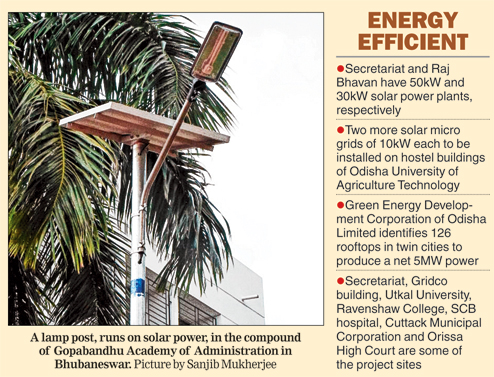
Bhubaneswar, Aug. 7: The Gopabandhu Academy of Administration would reduce its electricity bills by generating power on the campus and feeding the local grid.
Two smaller micro grids of 4kW and 3kW, respectively, will start generating solar power on the campus from next week. The power produced from these grids will be integrated with the overall supply routed through the Grid Corporation of Odisha, which, in turn, will deduce the institute's power bills, according to its supply.
Though the secretariat and the Raj Bhavan buildings are two other places in the city with big solar power harvesting structures on their roofs, in case of the academy, it is a smaller one.
Energy generation using micro grids for solar power supply is already in many European countries. Now, it is also gaining ground in India.
"The academy will be the first such institute in the city to have two micro grids, which will contribute power to the local grid, and in return, reap the benefits of reduced power bill," said Odisha Renewable Energy Development Agency deputy director (technical) Ashok Choudhury. The agency is the government body behind the implementation of the solar project.
A 10 kilowatt (kW) solar power plant supplies electricity to the lamp posts on the campus, where every now and then, snakes are spotted. The campus needs to be lighted during the evening and night hours.
Upendra Mallick, a trainee officer at the institute, said: "The use of solar power for the street lights is a welcome step as often snakes are spotted on the campus. I hope the move would inspire other institutes to implement the same." The academy trains probationers for the Odisha Administrative Services exams.
Choudhury also said they would integrate the entire campus to use solar energy. While the solar power is lighting up the campus and solar heating panels are supplying hot water to hostels, the grids will start supplying power to the distribution network shortly.
Joint commissioner of the academy Pradeep Kumar Nayak said: "The academy has invested Rs 40.35 lakh for the solar project, initiated by former director-general of the academy Ashok Kumar Tripathy."
He also said that while for the past three months, the 10kW solar power plant had been operational, the benefits could be analysed only after the integration of the two micro grids.
Another academy official said: "A 10kW plant will produce nearly 900 units of power a month, and with the current rate of tariff for power supply varying between Rs 5 and Rs 7 per unit (according to use), the academy can save around Rs 6,000 every month. Similarly, it would receive a rebate of Rs 4,600 every month from its energy bill by diverting 630 units of power from the two micro grids.










